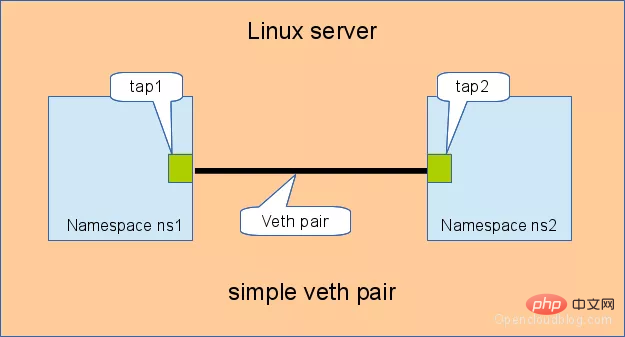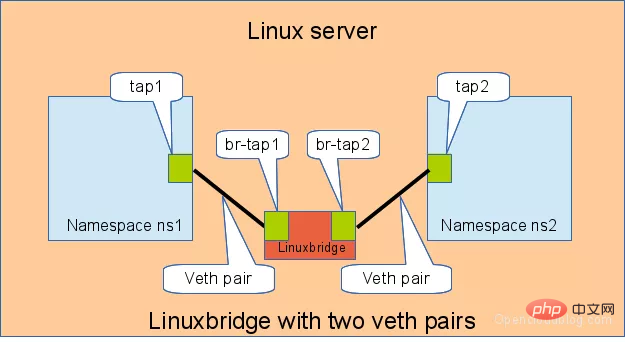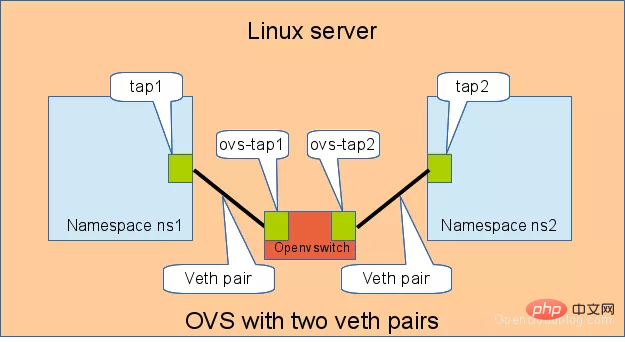
この記事では、veth-pair とその接続、および 2 つの名前空間間の接続について紹介します。
名前が示すように、 , veth-pair は仮想デバイス インターフェイスのペアで、tap/tun デバイスとは異なり、すべてペアで表示されます。一方の端はプロトコル スタックに接続され、もう一方の端は相互に接続されます。次の図に示すように:

#この機能により、さまざまな仮想ネットワーク デバイスを接続するためのブリッジとして機能することがよくあります。典型的な例は、「2 つの名前空間の間」のようなものです。 " "間の接続"、"Bridge と OVS 間の接続"、"Docker コンテナ間の接続" など、OpenStack Neutron のような非常に複雑な仮想ネットワーク構造を構築します。
上図の veth0 と veth1 に IP を割り当てます (それぞれ 10.1.1.2 と 10.1.1.3)。その後、veth0 から veth1 に ping を送信します。理論的には、これらは同じネットワーク セグメント上にあるため、ping は正常に実行できますが、結果として ping は失敗します。
パケットを取得して見てください。 tcpdump -nnt -i veth0
root@ubuntu:~# tcpdump -nnt -i veth0 tcpdump: verbose output suppressed, use -v or -vv for full protocol decode listening on veth0, link-type EN10MB (Ethernet), capture size 262144 bytes ARP, Request who-has 10.1.1.3 tell 10.1.1.2, length 28 ARP, Request who-has 10.1.1.3 tell 10.1.1.2, length 28
veth0 と veth1 が同じネットワーク セグメント内にあることがわかります。は初回接続なので事前にARPパケットを送信しますが、veth1はARPパケットに応答しません。
確認したところ、これは私が使用している Ubuntu システム カーネルの ARP 関連のデフォルト設定制限が原因であることがわかりました。設定項目を変更する必要があります:
echo 1 > /proc/sys/net/ipv4/conf/veth1/accept_local echo 1 > /proc/sys/net/ipv4/conf/veth0/accept_local echo 0 > /proc/sys/net/ipv4/conf/all/rp_filter echo 0 > /proc/sys/net/ipv4/conf/veth0/rp_filter echo 0 > /proc/sys/net/ipv4/conf/veth1/rp_filter
終了後にもう一度 ping してください。
root@ubuntu:~# ping -I veth0 10.1.1.3 -c 2 PING 10.1.1.3 (10.1.1.3) from 10.1.1.2 veth0: 56(84) bytes of data. 64 bytes from 10.1.1.3: icmp_seq=1 ttl=64 time=0.047 ms 64 bytes from 10.1.1.3: icmp_seq=2 ttl=64 time=0.064 ms --- 10.1.1.3 ping statistics --- 2 packets transmitted, 2 received, 0% packet loss, time 3008ms rtt min/avg/max/mdev = 0.047/0.072/0.113/0.025 ms
私たちはこの通信プロセスにさらに興味があるので、パケットをキャプチャして確認することができます。
veth0 ポートの場合:
root@ubuntu:~# tcpdump -nnt -i veth0 tcpdump: verbose output suppressed, use -v or -vv for full protocol decode listening on veth0, link-type EN10MB (Ethernet), capture size 262144 bytes ARP, Request who-has 10.1.1.3 tell 10.1.1.2, length 28 ARP, Reply 10.1.1.3 is-at 5a:07:76:8e:fb:cd, length 28 IP 10.1.1.2 > 10.1.1.3: ICMP echo request, id 2189, seq 1, length 64 IP 10.1.1.2 > 10.1.1.3: ICMP echo request, id 2189, seq 2, length 64 IP 10.1.1.2 > 10.1.1.3: ICMP echo request, id 2189, seq 3, length 64 IP 10.1.1.2 > 10.1.1.3: ICMP echo request, id 2244, seq 1, length 64
veth1 ポートの場合:
root@ubuntu:~# tcpdump -nnt -i veth1 tcpdump: verbose output suppressed, use -v or -vv for full protocol decode listening on veth1, link-type EN10MB (Ethernet), capture size 262144 bytes ARP, Request who-has 10.1.1.3 tell 10.1.1.2, length 28 ARP, Reply 10.1.1.3 is-at 5a:07:76:8e:fb:cd, length 28 IP 10.1.1.2 > 10.1.1.3: ICMP echo request, id 2189, seq 1, length 64 IP 10.1.1.2 > 10.1.1.3: ICMP echo request, id 2189, seq 2, length 64 IP 10.1.1.2 > 10.1.1.3: ICMP echo request, id 2189, seq 3, length 64 IP 10.1.1.2 > 10.1.1.3: ICMP echo request, id 2244, seq 1, length 64
奇妙なことに、ICMP echo Reply パケットが表示されませんでした。 pingしてもいいですか?
実際には、ここの echo Reply はローカルバック ポートを使用しています。信じられない場合は、パッケージを取得して見てください:
root@ubuntu:~# tcpdump -nnt -i lo tcpdump: verbose output suppressed, use -v or -vv for full protocol decode listening on lo, link-type EN10MB (Ethernet), capture size 262144 bytes IP 10.1.1.3 > 10.1.1.2: ICMP echo reply, id 2244, seq 1, length 64 IP 10.1.1.3 > 10.1.1.2: ICMP echo reply, id 2244, seq 2, length 64 IP 10.1.1.3 > 10.1.1.2: ICMP echo reply, id 2244, seq 3, length 64 IP 10.1.1.3 > 10.1.1.2: ICMP echo reply, id 2244, seq 4, length 64
Why?
コミュニケーションプロセス全体を見てみると理解できます。
echo request を構築し、ソケット経由でプロトコル スタックに送信します。 ip Route show table 0 でチェックします)。 プロセス全体を以下の図に示します。


# 创建 namespace ip netns a ns1 ip netns a ns2 # 创建一对 veth-pair veth0 veth1 ip l a veth0 type veth peer name veth1 # 将 veth0 veth1 分别加入两个 ns ip l s veth0 netns ns1 ip l s veth1 netns ns2 # 给两个 veth0 veth1 配上 IP 并启用 ip netns exec ns1 ip a a 10.1.1.2/24 dev veth0 ip netns exec ns1 ip l s veth0 up ip netns exec ns2 ip a a 10.1.1.3/24 dev veth1 ip netns exec ns2 ip l s veth1 up # 从 veth0 ping veth1 [root@localhost ~]# ip netns exec ns1 ping 10.1.1.3 PING 10.1.1.3 (10.1.1.3) 56(84) bytes of data. 64 bytes from 10.1.1.3: icmp_seq=1 ttl=64 time=0.073 ms 64 bytes from 10.1.1.3: icmp_seq=2 ttl=64 time=0.068 ms --- 10.1.1.3 ping statistics --- 15 packets transmitted, 15 received, 0% packet loss, time 14000ms rtt min/avg/max/mdev = 0.068/0.084/0.201/0.032 ms

# 首先创建 bridge br0 ip l a br0 type bridge ip l s br0 up # 然后创建两对 veth-pair ip l a veth0 type veth peer name br-veth0 ip l a veth1 type veth peer name br-veth1 # 分别将两对 veth-pair 加入两个 ns 和 br0 ip l s veth0 netns ns1 ip l s br-veth0 master br0 ip l s br-veth0 up ip l s veth1 netns ns2 ip l s br-veth1 master br0 ip l s br-veth1 up # 给两个 ns 中的 veth 配置 IP 并启用 ip netns exec ns1 ip a a 10.1.1.2/24 dev veth0 ip netns exec ns1 ip l s veth0 up ip netns exec ns2 ip a a 10.1.1.3/24 dev veth1 ip netns exec ns2 ip l s veth1 up # veth0 ping veth1 [root@localhost ~]# ip netns exec ns1 ping 10.1.1.3 PING 10.1.1.3 (10.1.1.3) 56(84) bytes of data. 64 bytes from 10.1.1.3: icmp_seq=1 ttl=64 time=0.060 ms 64 bytes from 10.1.1.3: icmp_seq=2 ttl=64 time=0.105 ms --- 10.1.1.3 ping statistics --- 2 packets transmitted, 2 received, 0% packet loss, time 999ms rtt min/avg/max/mdev = 0.060/0.082/0.105/0.024 ms
 ##2 つの名前空間間の接続もテストします:
##2 つの名前空間間の接続もテストします:
# 用 ovs 提供的命令创建一个 ovs bridge ovs-vsctl add-br ovs-br # 创建两对 veth-pair ip l a veth0 type veth peer name ovs-veth0 ip l a veth1 type veth peer name ovs-veth1 # 将 veth-pair 两端分别加入到 ns 和 ovs bridge 中 ip l s veth0 netns ns1 ovs-vsctl add-port ovs-br ovs-veth0 ip l s ovs-veth0 up ip l s veth1 netns ns2 ovs-vsctl add-port ovs-br ovs-veth1 ip l s ovs-veth1 up # 给 ns 中的 veth 配置 IP 并启用 ip netns exec ns1 ip a a 10.1.1.2/24 dev veth0 ip netns exec ns1 ip l s veth0 up ip netns exec ns2 ip a a 10.1.1.3/24 dev veth1 ip netns exec ns2 ip l s veth1 up # veth0 ping veth1 [root@localhost ~]# ip netns exec ns1 ping 10.1.1.3 PING 10.1.1.3 (10.1.1.3) 56(84) bytes of data. 64 bytes from 10.1.1.3: icmp_seq=1 ttl=64 time=0.311 ms 64 bytes from 10.1.1.3: icmp_seq=2 ttl=64 time=0.087 ms ^C --- 10.1.1.3 ping statistics --- 2 packets transmitted, 2 received, 0% packet loss, time 999ms rtt min/avg/max/mdev = 0.087/0.199/0.311/0.112 ms
veth-pair 在虚拟网络中充当着桥梁的角色,连接多种网络设备构成复杂的网络。
veth-pair 的三个经典实验,直接相连、通过 Bridge 相连和通过 OVS 相连。
http://www.opencloudblog.com/?p=66
https://segmentfault.com/a/1190000009251098
以上がLinux 仮想ネットワーク デバイス veth-pair の詳細な説明、この記事は非常に有益ですの詳細内容です。詳細については、PHP 中国語 Web サイトの他の関連記事を参照してください。


